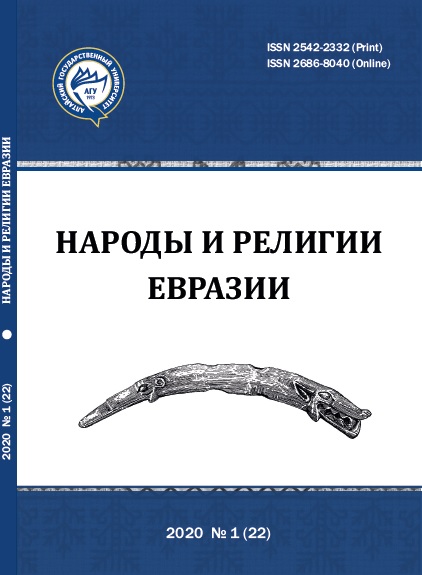Dynastic marriages and basis of succession in Zhuzhan State
Main Article Content
Abstract
The purpose of the article is to study the principles and foundations of succession in the Juan Haganate, as well as the marriage unions of the Juan rulers with the reigning dynasties of neighboring states. The author of the article reveals the sequence of transition of the highest power in the Zhuzhany state from the initial period of its existence, whereas in historical literature it is customary to begin the history of inheritance with the reign of Shelun, who first adopted the title of “kagan”. There is no careful calculation of the transfer of the throne even in the final period of the kaganate, when internal strife and civil strife began, when the Zhuzhansk society was divided into two hordes, in fact there was a situation of dual power, the result of which was a frequent change of rulers.
In general, the inheritance of the supreme power in the Zhuzhany state occurred, both in a straight line and in a collateral line. In periods of dawn and relative prosperity, peaceful relations with neighbors, inheritance, as a rule, occurred in a straight line (from father to son).During the years of major military failures, political and economic crises, cases of changing rulers along the collateral line (from brother to brother, from uncle to nephew, etc.) became frequent, often accompanied by the usual usurpation of power. In any case, power in the state remained in the hands of one, ruling clan.
As in other early and medieval societies, the dynastic marriage agreements of the Juan ruling house were aimed at concluding and securing peace treaties, favorable trade conditions, and generally determined relations with other states. Juan rulers sought and entered into dynastic marriages with Chinese imperial houses. These usually happened during periods of military success, when the Juan Hagans began to take themselves as equal to the Chinese emperors. In addition to China, marriage unions with the government house of the Ephthalites are known. At the same time, the Jujans did not go to dynastic marriages with representatives of the ruling circles, ethnic groups dependent on them. So, the kagan refused the marriage of the Juan princess to the Turkic ruler, who is his vassal. This refusal subsequently had a fatal consequence for the Zhuzhany state and society.
Downloads
Metrics
Article Details

This work is licensed under a Creative Commons Attribution 4.0 International License.
References
Васютин С. А. Антропология власти в кочевых империях (по материалам эпохи Тюркских каганатов) // Средние века. Исследования по истории Средневековья и раннего Нового времени. 2011. Вып. 72 (1–2). С. 306–329.
Васютин С. А. Социально-политическая организация кочевников Центральной Азии поздней древности и раннего Средневековья (Отечественная историография и современные исследования). Барнаул : Изд-во Алт. ун-та, 2009. С. 13–23.
Васютин С. А., Дашковский П. К. Социально-политическая организация кочевников Центральной Азии поздней древности и раннего Средневековья (отечественная историография и современные исследования). Барнаул : Изд-во Алт. ун-та, 2009. 400 с.
Гумилев Л. Н. Древние тюрки. М. : Товарищество «Клышников — Комаров и К», 1993. 513 с.
Дашковский П. К. К вопросу об изучении ментальности кочевников Центральной Азии // Интеграция археологических и этнографических исследований. Омск; Ханты-Мансийск : Изд-во пед. ун-та, 2002. С. 203–204.
Дашковский П. К. Мировоззрение и социально-политическая организация кочевников Саяно-Алтая поздней древности и раннего средневековья в отечественной историографии второй половины XIX — начала ХХI вв. : дис. … д-ра ист. наук. Барнаул, 2010. 663 с.
Крадин Н. Н. Кочевники Евразии. Алматы : Дайк-Пресс, 2007. 416 с.
Крадин Н. Н. Общественный строй Жужанского каганата // История и археология Дальнего Востока: к 70-летию Э. В. Шавкунова. Владивосток: Изд-во Дальневост. ун-та, 2000. С. 80–94.
Кычанов Е. И. История приграничных с Китаем древних и средневековых государств (от гуннов до маньчжуров). 2-е изд., испр. и доп. СПб.: Петербургское лингвистич. об-во, 2010. 364 с.
Кычанов Е. И. Кочевые государства от гуннов до маньчжуров. М.: Восточная литература, 1997. 320 с.
Материалы по истории сюнну (по китайским источникам) / предисловие перевод и примечание В. С. Таскина. Вып. 1. М., 1968. 177 с.
Паркер Эдуард. Татары. История возникновения великого народа. М. : ЗАО Центр-полиграф, 2008. 223 с.
Султанов Т. И., Кляшторный С. Г. Государства и народы Евразийских степей. Древность и средневековье. СПб. : Петерб. востоковедение, 2000. 320 с.
Таскин В. С. Материалы по истории древних кочевых народов группы дунху. М.: Наука, 1984. 487 с.
Торланбаева К. У. Дуальная организация и система наследования у восточных тюрков. 2007. URL: http://www.ethnonet.ru/ru/pab/0504–02.html (дата обращения: 07.13.2017).

